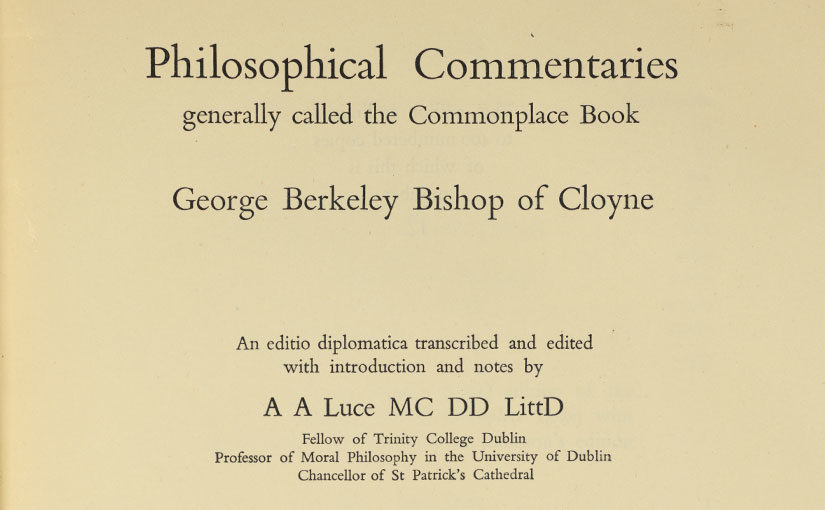by Arpit Kumar, Ph.D. Candidate, Notre Dame’s Department of English
In 1993, Hesburgh Library acquired a part of Arthur Aston Luce’s George Berkeley collection, which contains a lifetime of scholarship centered on Luce’s protagonist, Irish philosopher George Berkeley (1685-1753). Luce (1882-1977) unearthed previously neglected or unknown materials that changed the course of Berkeley criticism. Berkeley’s reputation was of an erratic but energetic, insightful but inconsistent thinker but in Luce’s writings he emerges as a precise and disciplined intellect, conversant with a continental philosophical tradition, and committed to forwarding a considered theory of immaterialism. The collection also contains items from Luce’s library including rare early eighteenth-century editions of Berkeley’s works (printed in London and Dublin) as well as later landmark nineteenth-century editions. The Hesburgh Library has added to the collection over a period of time.
Luce’s own extensive work, replete with penciled notes and corrections, is also represented in the collection. This includes two of his hand-written notebooks which served as the basis for his edition of Berkeley’s Philosophical Commentaries. The collection also contains Luce’s celebrated biography of Berkeley. Luce’s annotations are useful for scholars interested in studying the progress of Berkeley’s mind from his early Trinity phase to the truncated Bermuda project and his mature thought. The collection will appeal to those researchers and students who wish to interrogate the unique clubbability of these two men who were clearly allied in spirit even if separated by time.
While the early Dublin edition(s?) of 1709 of New Theory of Vision are not a part of Luce’s collection, a copy of the 1733 London edition of great rarity is present.
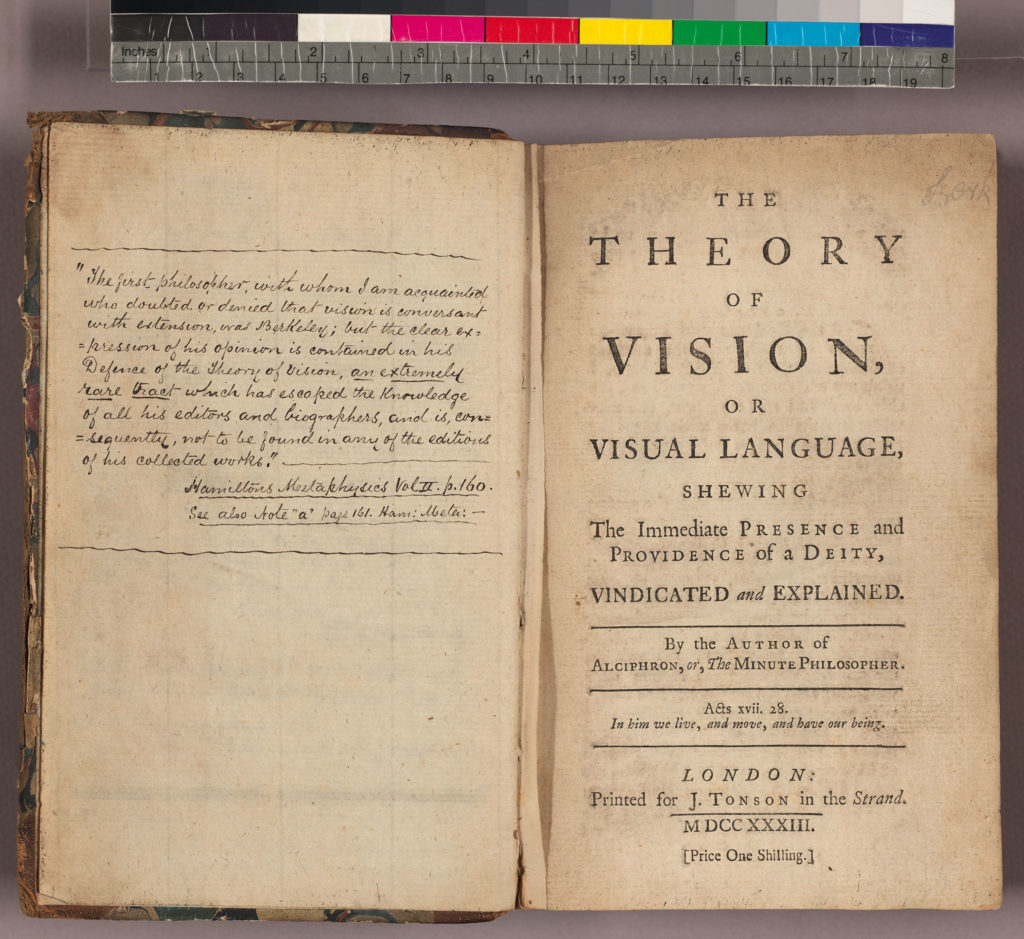
For almost a century after Berkeley’s death his readers remained unaware of the edition’s existence. In this work, Berkeley produced what is still considered one of his great contributions to philosophy by examining the dynamics of human vision in the perception of distance and magnitude by the interaction of ideas of sight and touch. Berkeley’s explanation provided an alternative to the prevalent standard account of visual perception which required geometrical calculations. Adam Smith regarded Berkeley’s theory of vision as complete in itself and considered it “…one of the finest examples of philosophical analysis” (qtd. in Keynes, 7).
The collection also contains a copy of The Works (1871) edited by A.C. Fraser which is of interpretive value for Berkeley scholars and contains substantial annotations made by Luce especially in sections pertaining to The Theory of Vision Vindicated (1733).
The copy of Three Dialogues is in a beautiful and seductive modern calf binding of bookbinder Joseph Zaehnsdorf (1814–1886).
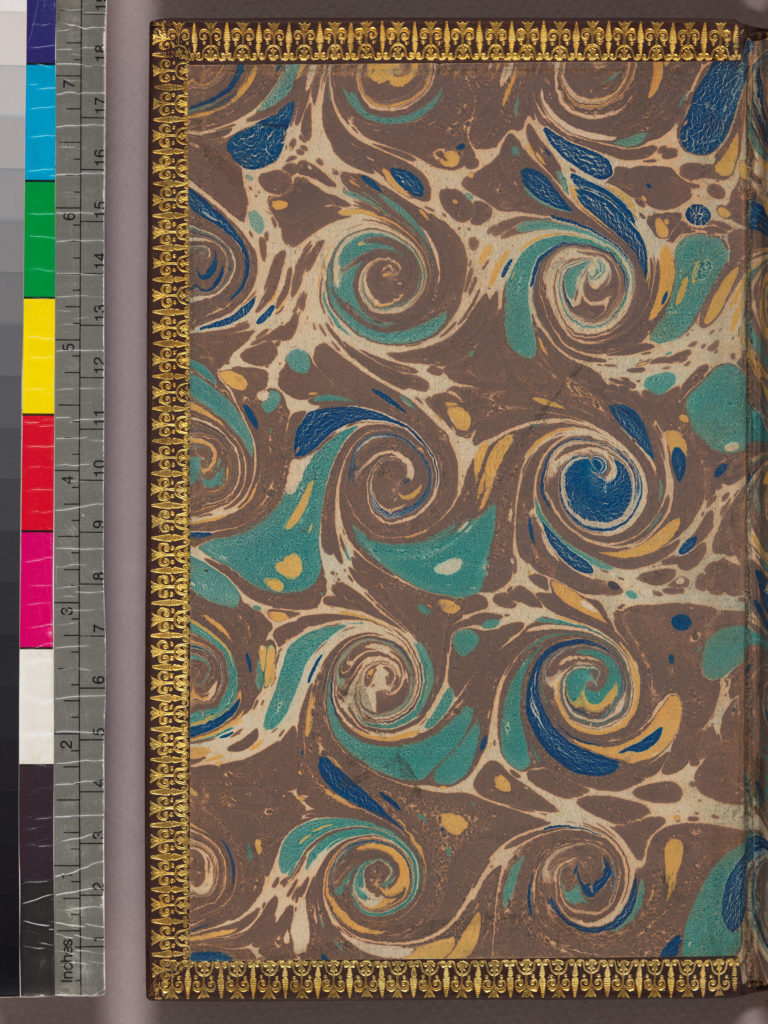
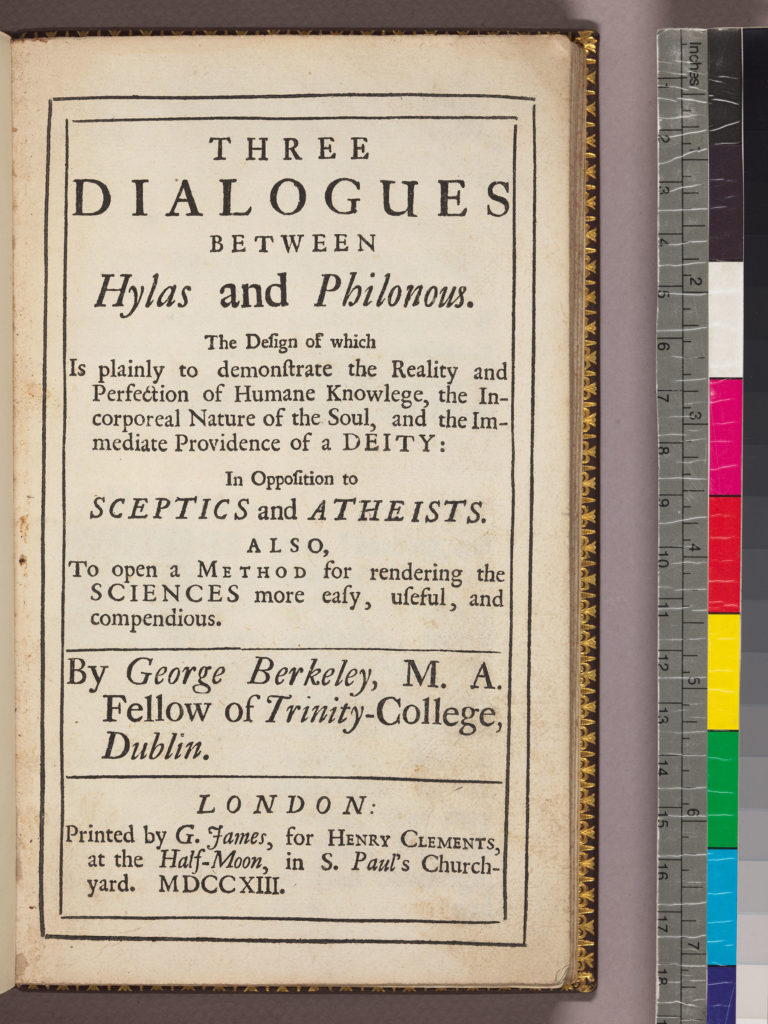
This work served Berkeley’s intentions of communicating the sum of his philosophical writings presented in New Theory of Vision and Principles of Human Knowledge in a more accessible and literary form: the dialogue. Luce believed that the dialogues “had a greater success than the Principles, and undoubtedly made an impression.” (qtd. in Keynes 27).
The Dublin and London editions of A Miscellany (1752) will also interest scholars, especially for containing the first printings of Berkeley’s “Verses on the Prospect of Planting Arts and Learning in America”. The poem was originally received by Sir John Percival in a letter from Berkeley dated 10 February 1725/6 and some changes of interest are to be found in the printed versions (Keynes 252). Another edition of A Miscellany also contains penciled marginalia from Luce on De Motu, an essay in Latin on ideas of motion composed while Berkeley was visiting France in 1720/1. The Miscellany also contains Berkeley’s work from the period before the Bermuda College Scheme, including a tract titled, “An Essay Towards Preventing the Ruin of Great-Britain”(1721). Written in the aftermath of the South Sea Affair (1720), the tract proclaims Britain’s moral and economic decline while offering modes of redress. Berkeley mounts a scathing attack on the preference for trade over religion arguing that luxury and speculation have gripped the British nation leaving little space for honest industry. The tracts provide useful context for an analysis of Berkeley’s motivations when embarking on the Bermuda project.
The Hesburgh Library has added gradually to the collection, including the significant arrival in December 2020, of Luce’s own copy of the Philosophical Commentaries published as a limited edition in 1943 as well as two hand-written folio volumes of transcription and notes.
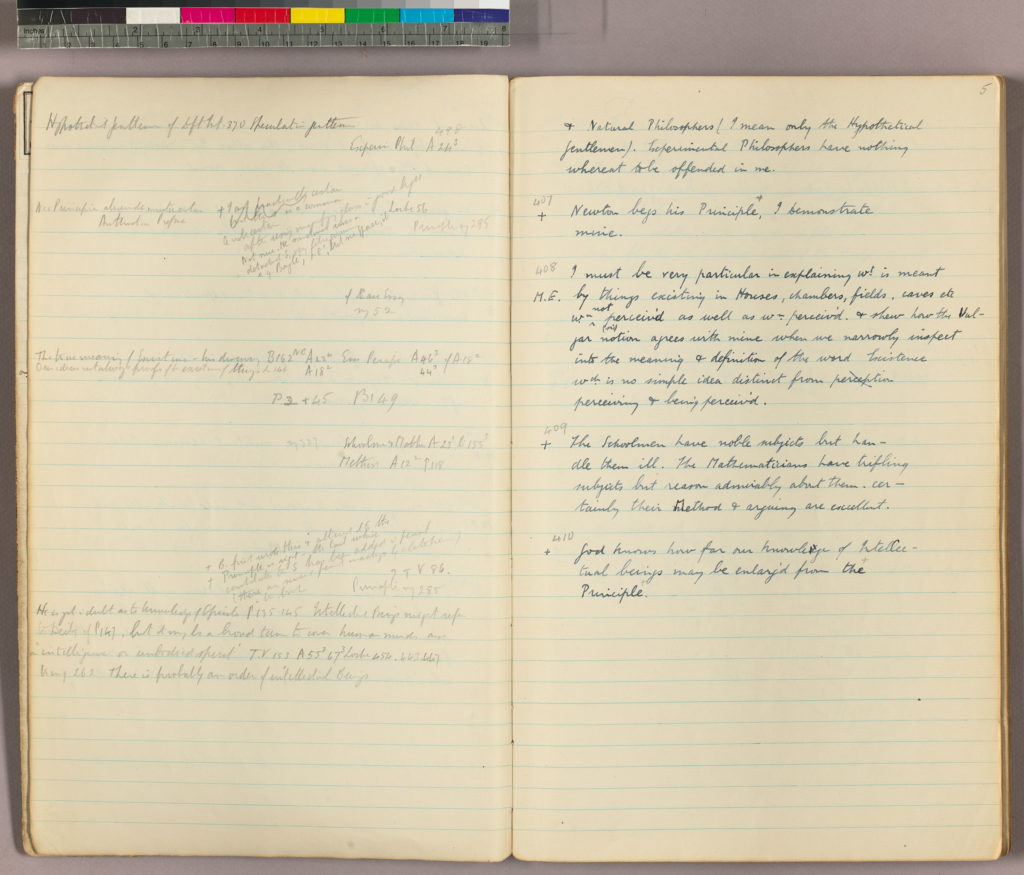
The notes were the basis for Philosophical Commentaries, Luce’s version of Berkeley’s Commonplace Book. He styled the work as Philosophical Commentaries with the conviction that Berkeley’s text was less a standalone book of meditations and more a set of commentaries on previous writings. While critical opinion is often divided on Luce’s theorization about the existence of such previous work and on the status of the Commentaries as a text, the editio diplomatica is invaluable for capturing the vitality of Berkeley’s philosophical meditations. Luce held that the almost nine-hundred philosophical notes divided between two Notebooks (A and B) were composed by Berkeley in a short duration in 1707– as a “living and growing thing…a great system of thought in the making” (Preface, vii). The work was undoubtedly a workshop for the mature ideas that found their way into the New Theory of Vision as well as the Principles of Human Knowledge. As a diplomatic edition, it ventures to replicate in typography all essential features of the original Notebooks Berkeley composed as a young, ambitious scholar in his early twenties.
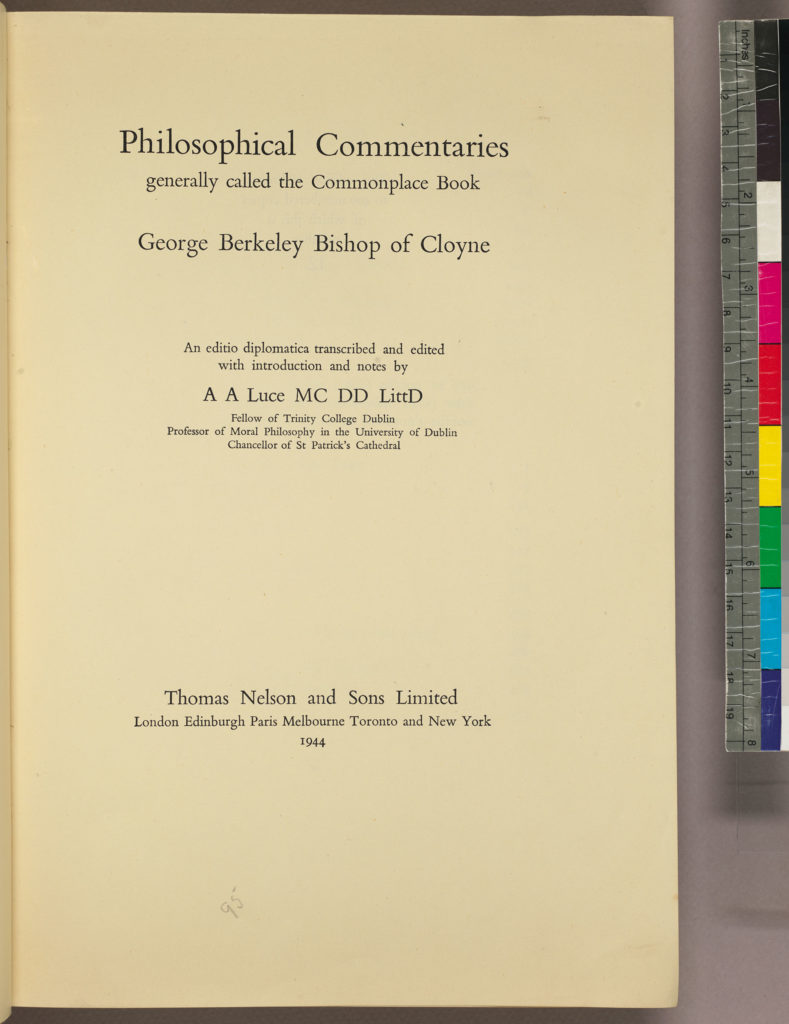
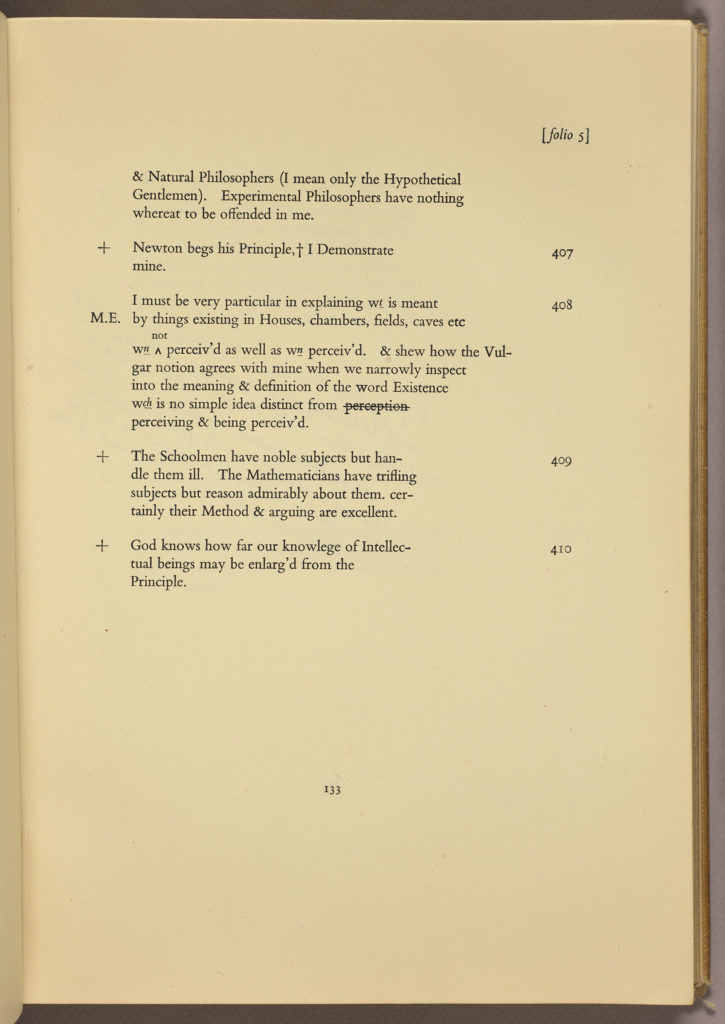
Luce’s Philosophical Commentaries brings alive Berkeley’s process of thinking and composition: giving the reader unparallelled access to his hesitations, doubts, habits of thought, doubts as he set about crafting his case against materialism. For instance, Luce notes the specificity of Berkeley’s use of capital letters in the notebooks: “…Berkeley uses the capital to express anti-thesis, stress, subtle shades of meaning, or turns of thought; one can often see the purport of an entry by a glance at its capitals, and the fairly systematic change of idea into Idea is decisive on certain textual questions.” (Introduction, xv).
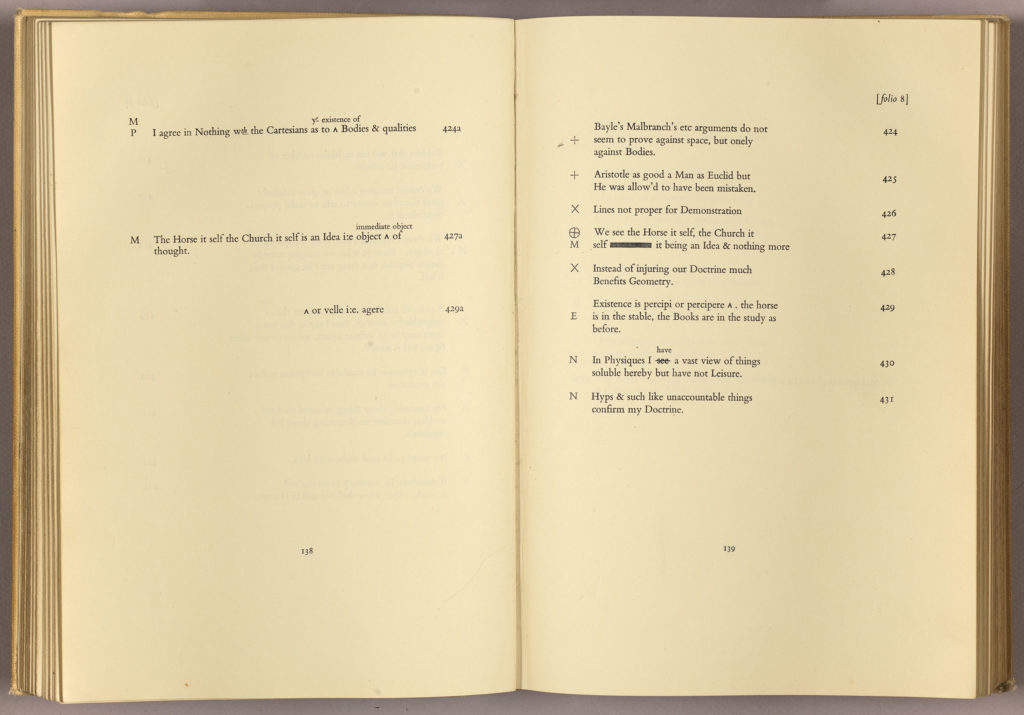
Luce’s edition was aimed at the urgent correction of Berkeley’s status in the canons of philosophy: he specifically aimed to correct the notion, cultivated and propagated by A.C. Fraser’s work on Berkeley, that the philosopher was an “…ill-read young man from a semi-barbarous country, who in the ardor of youth hurried into print with an immature argument” (Preface, viii). Luce was determined to persuade readers through the diplomatic edition that Berkeley’s philosophy was carefully considered and systematized, even theorizing the existence of a prior work upon which Berkeley had been commentating in these notebooks. As Luce states of the notebooks, “[they are] systematic and highly particularized, comments focused upon a complex argument for immaterialism which was present in outline in Berkeley’s mind for some time before he began to fill the notebooks” (ix). Luce strove to reform scholarly consensus about the notebooks from impromptu, haphazard utterances into a precise record of an intermediate but pivotal stage of Berkeley’s philosophical progress.
Luce’s editorial work and criticism was instrumental in radically reconstructing the twentieth-century’s view of the Irish philosopher. Luce’s Berkeley collection will appeal to Berkeley scholars as well as all researchers interested in rigorous editorial practices.
